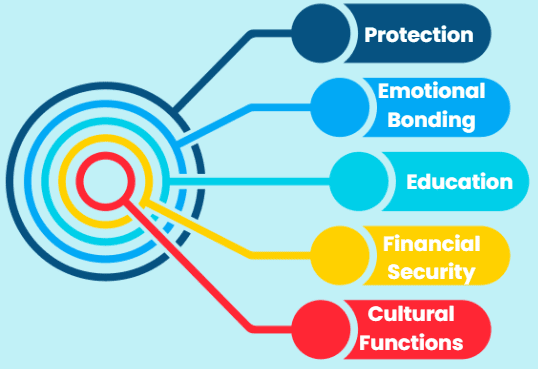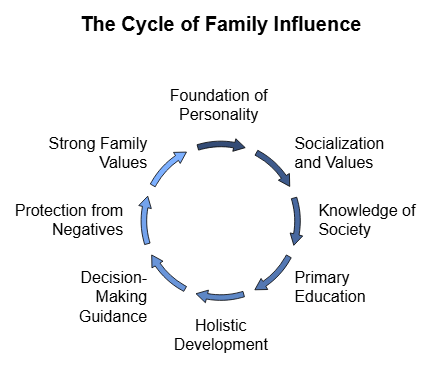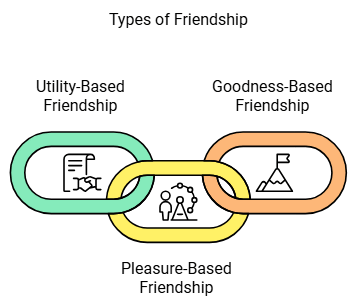Notes: Family & Friends | EVS & Pedagogy Paper 1 for CTET & TET Exams - CTET & State TET PDF Download
| Table of contents |

|
| Family |

|
| Functions of Family |

|
| Types of Family |

|
| Other Types of Family |

|
| Importance of Family |

|
| Friends |

|
| Family Relationships |

|
| Work and Play |

|
Family
Family plays an important role in child’s social and emotional development. Family relationships lay the foundation for all other relationships. Through these experiences, children learn to trust others and seek out friendship and comfort.  A Family
A Family
Definition of Family
- The family is a social institution that performs important tasks and contributes to society’s basic needs.
- It is defined as the core of the social structure and a fundamental unit of society where two or more people are related to each other either by marriage, blood, or adoption.
- Generally, a family consists of a father, mother, and children, but it may also include other members like grandparents, uncles, and aunts.
Characteristics of Family
- Family as a System of Nomenclature: Children inherit the family name, which is passed down through generations along with religious and caste names.
- Universality: Family is a universal institution found in every society. There is no society without some form of family, and every individual belongs to a family.
- Nuclear Position in Society: Just as the cell is the basic unit of the human body, the family is the basic unit of society. Society is made up of many families.
- Sense of Responsibility: Parents are responsible for the well-being of their children, and children are expected to obey their parents. Families also protect their status and prestige in society, especially during crises.
- Social Control: The family acts as a mechanism of social control, teaching children what is right and wrong through praise and punishment.
Functions of Family
A family performs various important functions that contribute to the well-being of its members and society as a whole.  Functions of Family
Functions of Family
Let's explore these functions in detail:
1. Protection
- At birth, a child is entirely dependent on adults for their needs. The family's care is crucial for the baby's survival.
- The family not only cares for children but also looks after sick and elderly members, ensuring their protection and well-being.
2. Emotional Bonding
- Love and affection from parents and family members are vital for a child's development.
- Strong emotional bonds within the family make children feel valued and loved, helping them grow into well-adjusted adults.
3. Education
- The family serves as a child's first school, teaching them societal norms, values, and basic skills.
- Traditional skills and knowledge are passed down, preparing children for future roles and careers.
4. Financial Security
- The family provides financial security by meeting the basic needs of its members, such as food, shelter, and clothing.
- Work is divided among family members, with some earning income and others handling household tasks, ensuring all needs are met.
5. Cultural Functions
- The family imparts customs and traditions, passing cultural values from one generation to the next.
- Culture varies between families and is an essential aspect of a child's upbringing.
Types of Family
In India, families can be broadly classified into two types: nuclear families and joint families.
1. The Nuclear Family
- A nuclear family typically consists of a married couple and their unmarried children. Sometimes, additional relatives like an unmarried or widowed sister may live with them.
- Advantages of a nuclear family include:
- Encouragement of initiative, independence, and self-reliance among members.
- Promotion of decision-making skills in children, boosting their self-confidence.
- Greater privacy and opportunities for interaction, fostering deeper emotional ties.
 Types of Family
Types of Family
2. The Joint Family
- A traditional joint family includes a man, his wife, their unmarried daughters, sons, their wives and children. If grandsons are married, their wives and children also join the family.
- A joint family comprises multiple nuclear families living together, sharing a common kitchen and property. The oldest male member usually acts as the head and decision-maker, though women also play a significant role in influencing decisions.
- Advantages of a joint family include:
- Fostering cooperation and accommodation among members.
- Providing emotional and economic support to children in case of parental death.
- Caring for the old, helpless, and unemployed family members.
- Ensuring greater financial security.
Other Types of Family
1. Patrilocal Family
- In a patrilocal family, the married couple resides with the husband's family. This arrangement often emphasizes the husband's family lineage and property.
2. Matrilocal Family
- In a matrilocal family, the married couple lives with the wife's family. This setup highlights the wife's family lineage and property.
- In both patrilocal and matrilocal families, the husband may have a secondary position within the family structure, depending on the specific family dynamics and cultural practices.

Importance of Family
Family plays a crucial role in shaping a child's personality, character, and values. Here are some key points about the importance of family:
- Foundation of Personality: Family is where the foundation of a child's personality and character is laid.
- Socialization and Humanistic Values: Family helps socialize a child and instill humanistic values.
- Knowledge of Society: Family imparts knowledge about society, ways of living, beliefs, ideals, traditions, values, and social responsibility.
- Primary Education: Family is the first place where children receive education, both formal and informal.
- Holistic Development: Family provides physical, mental, emotional, cultural, and moral development, which is crucial for a child's future.
- Decision-Making Guidance: Family helps in making important decisions and provides guidance during difficult times.
- Protection from Negative Influences: Family protects children from negative outside influences, such as peer pressure.
- Strong Family Values: Families with strong values help in building and maintaining relationships, passing on these values to future generations.
Friends
Friends are individuals with whom we share a mutual relationship of affection, trust, cooperation, and support.  Friends
Friends
Unlike family, friendship is a bond we choose based on our interests and preferences. Here are some key points about friends and their significance in our lives:
- Mutual Support: True friends stand by each other in both joyous and challenging times, offering protection and assistance.
- Mutual Respect: Friendship is built on respect for one another, fostering a sense of equality and understanding.
- Choice of Friends: Friendship is unique in that we have the freedom to choose our friends based on shared interests, without any obligation.
- Impact on Development: Friends play a crucial role in a child's overall development. Positive social relationships during childhood and adolescence contribute to better personality development and safeguard against psychological issues later in life.
- Distinction Between Acquaintances and Friends: Not everyone we know is a friend; some individuals are merely acquaintances or associates. True friends have a deeper bond built on mutual trust and support.
Types of Friends
According to Aristotle, friendship can be classified into 3 types:
- Friendship of Utility: Friendship based on mutual benefit and personal interests.
- Friendship of Pleasure: Friendship centered around shared interests and enjoyment.
- Friendship of the Good: Friendship rooted in mutual respect and moral goodness, beyond mere interests or pleasures.

Importance of Friends
- Friendship fosters closeness, association, and mutual trust without selfish motives.
- For children, making friends is crucial for social and emotional development, helping them learn about themselves and build their identity.
- Friends play a vital role in reducing stress and helping navigate challenging experiences, especially during adolescence.
- Creating friendships equips children with life skills, boosts confidence, and enhances self-esteem.
- Friendship provides opportunities for leadership skill development as children interact and play with peers.
- Playing freely with other children stimulates imagination, which is essential for a child's growth.
- Friends offer a support system where children can share their concerns, dreams, and fears, alleviating feelings of loneliness and isolation.
Family Relationships
Relatives are individuals in a society or family who are connected to each other by blood relations, marriage, feelings, or emotions. Relatives and relationships significantly influence a child's growth and development. A child develops initial communication skills and interpersonal relationships by interacting with and observing relatives. The child also develops attitudes towards life, qualities such as sympathy, empathy, compassion, sensitivity, and awareness of cultural and religious practices, by observing family members and relatives. Family relationships depend on how each member behaves and interacts with one another.
Classification of Relationship
- Marital Relationship: These relationships arise due to marriage. Examples include husband-wife, mother-in-law, father-in-law, daughter-in-law, and son-in-law.
- Blood Relationship: In this type of relationship, individuals are related by birth rather than by marriage. Examples include son-daughter, brother-sister, sister-sister, father-aunt, and father-uncle.
Work and Play
 Famous educationist Maria Montessori has said, “Play is the work of the child.” Play activities are essential to healthy development for children and adolescents. The activities by children stimulate and influence the pattern of the connections made between the nerve cells. Activities influence the development of fine and gross motor skills, language, socialization, personal awareness, emotional well-being, creativity, problem-solving, and learning ability. The most important role that play can have is to help children be active, make choices, and practice actions to mastery. Play links sensorimotor, cognitive, and social-emotional experiences and provides an ideal setting for brain development.
Famous educationist Maria Montessori has said, “Play is the work of the child.” Play activities are essential to healthy development for children and adolescents. The activities by children stimulate and influence the pattern of the connections made between the nerve cells. Activities influence the development of fine and gross motor skills, language, socialization, personal awareness, emotional well-being, creativity, problem-solving, and learning ability. The most important role that play can have is to help children be active, make choices, and practice actions to mastery. Play links sensorimotor, cognitive, and social-emotional experiences and provides an ideal setting for brain development.
Importance of Play in Development of Child
- Work and play are crucial for the overall development of a child, making play significant in the school curriculum.
- Teaching becomes easier for children through games or play, leading to better memory retention.
- Playing influences the development of fine and gross motor skills, language, socialization, personal awareness, emotional well-being, creativity, problem-solving, and learning ability.
- Play helps children be active, make choices, and practice actions to mastery.
- Children should experience a wide variety of content such as art, music, language, science, math, and social relations.
- Through constructive activities and games, children learn something new.
- These plays and games help build imagination, develop thinking skills, enhance creativity, and foster cooperation and teamwork.
- Games, sports, and other physical activities contribute to developing immunity and enable the body to fight against diseases and infections.
- Cognitive development involves forming self-concept and concepts of size, shape, and colors.
- Diverse materials enable children to differentiate between shapes, sizes, colors, textures, and volumes.
- Socio-emotional development includes establishing relationships and developing behavioral controls and social skills.
- According to Montessori, the essential dimensions of play are voluntary, enjoyable, purposeful, and spontaneous.
- Play expands creativity using problem-solving skills, social skills, language skills, and physical skills.
- Play helps expand on new ideas, aids social adaptation, and helps thwart emotional problems.
- If play is the work of the child, then toys are the tools.
- Through toys, children learn to:
- Figure out how things work.
- Pick up new ideas.
- Build muscle control and strength.
- Use their imagination.
- Solve problems.
- Learn to cooperate with others.
- With the influence of electronic media, children spend time being passively entertained or minimally interacting with devices.
- Today’s toys are often structured by onboard computers, dictating the play experience.
- This robs children of unstructured play with other kids and individual creative playtime.
- Parents need to understand the play needs of their child and provide an environment to meet those needs.
|
21 videos|139 docs|41 tests
|
FAQs on Notes: Family & Friends - EVS & Pedagogy Paper 1 for CTET & TET Exams - CTET & State TET
| 1. What are the primary functions of a family? |  |
| 2. What are the different types of families? |  |
| 3. Why is family important in a person's life? |  |
| 4. How do friendships complement family relationships? |  |
| 5. What role do families play in work-life balance? |  |
















